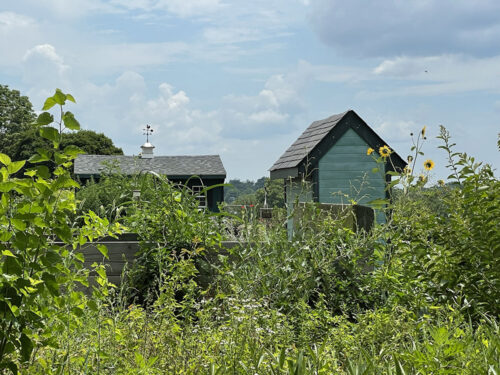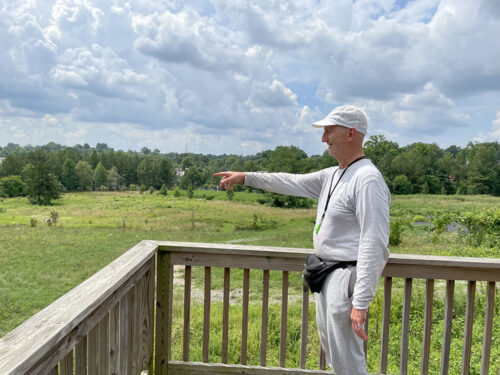
WASHINGTON — Mercy Sister Leslie Porreca has been gardening all her life — from working in her family garden to setting up gardens in each of the religious communities where she has lived — using available space from patio container pots to farm acres.
For the past few years, she has spent about eight hours a day either gardening or caring for animals at the Redeemer Valley Farm outside of Philadelphia run by the Holy Redeemer Sisters. The garden includes individual plots and a two-acre community-supported garden. The garden’s vegetables are donated to local food banks or sold at a farmers market.
For Sister Leslie, who also works as a licensed therapist, gardening is a labor of love.
She’s not alone either; in the United States, gardening has gained momentum in the past few years, and it particularly surged during the COVID-19 pandemic. Current gardening statistics show that about 55% of American households do some kind of gardening — spending 4-5 hours a week on it.
Favorite garden produce last year in the U.S. was the tomato, followed by peppers, cucumbers, herbs, and carrots, according to an Axiom survey.
Studies also show that gardening provides something that cannot be measured in produce: improved physical and mental health. The hobby is said to reduce anxiety and even help people recover from surgeries.
But Sister Leslie also sees another benefit to planting, watering, weeding, and harvesting fruits and vegetables. As she puts it, gardening provides “a very spiritual experience for me every day.”
She told The Tablet she spends half of the summer on her knees weeding and tending to plants and giving them support. “That’s really such a basic relationship. It’s kind of how God is with us, guiding us, supporting us, nurturing us,” she said, adding that the whole process is faith-filled and healing, particularly through watching seeds develop and bear fruit.
“It doesn’t get old,” she said, noting that the consistent thread with gardening is observing nature and responding to it, saying it mirrors faith where there is mystery, death, and new birth.
Finding spiritual analogies in garden work isn’t that hard to imagine since the Bible is full of gardening images right from the start with the Garden of Eden, and parables throughout the New Testament speak of faith as either the size of a mustard seed or requiring good soil for growth.

Margaret Rose Realy, a Benedictine oblate, who is a liturgical garden consultant in Michigan and author of several books on spirituality and gardening, is keenly aware of the ways gardening and faith are interwoven.
In her 2015 book, “A Catholic Gardener’s Spiritual Almanac,” she writes: “When I seek peace or solace in my life I am drawn to a garden. The working in soil and among plants drains pent-up energy. I feel physical release and rejuvenated spiritually as I labor and pray. … Whether I am working or walking, I open myself to the presence of God in nature.”
Realy also writes that monks and nuns over history have embraced the spiritual and physical connections in gardens or what she said the Irish describe as a “thin place” where the space between heaven and earthly realms becomes narrow.
This experience continues today at the Franciscan Monastery of the Holy Land in America, located in Washington near The Catholic University of America and the Basilica of the Shrine of the Immaculate Conception.
The monastery, just three miles from the U.S. Capitol, is well-known for its Byzantine-style church, outdoor shrines, and public flower gardens, but behind a private gate on the grounds is a 15-acre oasis that is home to a meadow, a two-acre urban garden, a large greenhouse, a cemetery for the Franciscan friars and two hermitages for private retreats.
Franciscan Father David Wathen, who lives in the monastery where he serves as director of the Franciscan Monastery Pilgrimage Office, said the vegetable garden, which provides food for the friars, who donate most of its produce to local food banks, “fits in well with our spirituality.”
The urban garden continues to expand each year and is maintained by a volunteer garden guild under the direction of Lou Maroulis, a retiree who worked as an IT project manager. He says his four-day-a-week role as garden manager since 2014 — which involves outlining and carefully sticking to a tight gardening schedule and coordinating groups of volunteers and donation pickups — “is the most rewarding thing I’ve ever done in my life.”
Since 2014, when the garden changed its priority to provide food for the local community, it has donated 38 tons of produce. As Maroulis sees it, this outreach perfectly reflects the biblical passage of Matthew 10: “Without cost you have received; without cost you are to give.” That’s because so much is donated to the garden — seeds, trays, planting pots, and labor — and then in turn the produce is also given away. That’s not to say the garden doesn’t need funding though. It is supported through annual fundraisers and monetary donations.
The head of the gardening guild also said what the group is able to do as stewards of the friars’ land is the “living embodiment of “Laudato Si’,” the 2015 encyclical on the environment by Pope Francis that stresses care for the natural environment and all people.
Throughout the summer, volunteer groups come to weed and harvest the garden, which is where Maroulis has also seen a spiritual side of the ongoing work. He said that in the past several years he has frequently seen how people come to the garden for “whatever they must be healed of or from, and then as they’re healed, they do other things.”
But finding inner peace or a sense of calm through nurturing plants or pulling weeds does not have to happen via a large-scale project donating to those in need.
Bishop Emeritus Nicholas DiMarzio sees a spiritual side to his own small garden of tomatoes, lettuce, herbs, and pumpkins that he grows for the pumpkin flowers, but have not yet sprouted.
Bishop DiMarzio said the process is relaxing, because as with other hobbies he has, such as cooking, when you are doing those things “that’s what you’re concentrating on,” and it takes your mind off other concerns for the moment.
He also recognizes a bigger picture in the simple task of helping something grow from seed. “It reminds you of creation,” he said, adding that it also provides a way of “cooperating with God’s work.”
